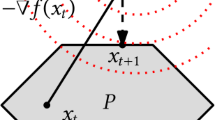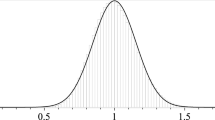Abstract
We consider a new class of problems in elasticity, referred to as Data-Driven problems, defined on the space of strain-stress field pairs, or phase space. The problem consists of minimizing the distance between a given material data set and the subspace of compatible strain fields and stress fields in equilibrium. We find that the classical solutions are recovered in the case of linear elasticity. We identify conditions for convergence of Data-Driven solutions corresponding to sequences of approximating material data sets. Specialization to constant material data set sequences in turn establishes an appropriate notion of relaxation. We find that relaxation within this Data-Driven framework is fundamentally different from the classical relaxation of energy functions. For instance, we show that in the Data-Driven framework the relaxation of a bistable material leads to material data sets that are not graphs.
Similar content being viewed by others
References
Agarwal, R.; Dhar, V.: Big data, data science, and analytics: the opportunity and challenge for IS research. Inf. Syst. Res. 25, 443–448 (2014)
Allaire, G.: Shape optimization by the homogenization method, vol. 146. Applied Mathematical SciencesSpringer, New York (2002)
Ball, J.M.: Convexity conditions and existence theorems in nonlinear elasticity. Arch. Ration. Mech. Anal. 63, 337–403 (1976/77)
Ball, J.M.; James, R.D.: Fine phase mixtures as minimizers of the energy. Arch. Ration. Mech. Anal. 100, 13–52 (1987)
Conti, S.; Dolzmann, G.: On the theory of relaxation in nonlinear elasticity with constraints on the determinant. Arch. Ration. Mech. Anal. 217, 413–437 (2015)
Cherkaev, A.: Variational methods for structural optimization, vol. 140. Applied Mathematical SciencesSpringer, New York (2000)
Dacorogna, B.: Weak continuity and weak lower semicontinuity of nonlinear functionals, vol. 922. Lecture Notes in MathematicsSpringer, Berlin (1982)
Dacorogna, B.: Direct methods in the calculus of variations, vol. 78. Applied Mathematical SciencesSpringer, Berlin (1989)
Dal Maso, G.: An Introduction to \(\Gamma \)-Convergence. Progress in Nonlinear Differential Equations and Their Applications. Birkhauser, Boston (1993)
Francfort, G.A.; Murat, F.: Homogenization and optimal bounds in linear elasticity. Arch. Ration. Mech. Anal. 94, 307–334 (1986)
Fonseca, I.; Müller, S.: \({\cal{A}}\)-quasiconvexity, lower semicontinuity, and Young measures. SIAM J. Math. Anal. 30, 1355–1390 (1999)
Girault, V.; Raviart, P.-A.: Finite element approximation of the Navier-Stokes equations, vol. 749. Lecture Notes in MathematicsSpringer, Berlin (1979)
Kalidindi, S.R.; De Graef, M.: Materials data science: current status and future outlook. Ann. Rev. Mater. Res. 45, 171–193 (2015)
Khachaturyan, A.G.: Some questions concerning the theory of phase transformations in solids. Sov. Phys. Solid State 8, 2163–2168 (1967)
Khachaturyan, A.G.: Theory of Structural Transformations in Solids. Wiley, New York (1983)
Kirchdoerfer, T.; Ortiz, M.: Data-driven computational mechanics. Comput. Methods Appl. Mech. Eng. 304, 81–101 (2016)
Kohn, R.V.: The relaxation of a double-well energy. Contin. Mech. Thermodyn. 3, 193–236 (1991)
Khachaturyan, A.G.; Shatalov, G.: Theory of macroscopic periodicity for a phase transition in the solid state. Sov. Phys. JETP 29, 557–561 (1969)
Kohn, R.V.; Strang, G.: Optimal design and relaxation of variational problems. I. Commun. Pure Appl. Math. 39, 113–137 (1986)
Kohn, R.V.; Strang, G.: Optimal design and relaxation of variational problems. II. Commun. Pure Appl. Math. 39, 139–182 (1986)
Milton, G.W.: The Theory of Composites. Cambridge University Press, Cambridge (2002)
Müller, S., Šverák, V.: Unexpected solutions of first and second order partial differential equations. In: Proceedings of the International Congress of Mathematicians, Vol. II (Berlin, 1998), number Extra Vol. II, pp. 691–702, 1998
Müller, S.; Šverák, V.: Convex integration for Lipschitz mappings and counterexamples to regularity. Ann. Math. 2(157), 715–742 (2003)
Murat, F., Tartar, L.: Calcul des variations et homogénéisation. In: Bergman, D.J., et al. (eds.) Les méthodes de l'homogénéisation: théorie et applications en physique, pp. 319–370. Eyrolles, 1985. Translated in [25]
Murat, F., Tartar, L.: Calculus of variations and homogenization. In: Cherkaev, A., Kohn, R. (eds.) Topics in the Mathematical Modelling of Composite Materials, volume 31 of Progr. Nonlinear Differential Equations Appl., pp. 139–173. Birkhäuser Boston, 1997
Müller, S.: Variational models for microstructure and phase transitions. In: Bethuel, F., et al. (eds.) Calculus of variations and geometric evolution problems, Springer Lecture Notes in Math, pp. 85–210. 1713Springer, Berlin (1999)
Murat, F.: Compacité par compensation. Ann. Sc. Norm. Super. Pisa, Cl. Sci., IV. Ser. 5, 489–507, 1978
Murat, F.: Compacité par compensation: condition necessaire et suffisante de continuite faible sous une hypothèse de rang constant. Ann. Sc. Norm. Super. Pisa, Cl. Sci., IV. Ser. 8, 69–102, 1981
Nesi, V.: Bounds on the effective conductivity of two-dimensional composites made of \({n \geqq 3}\) isotropic phases in prescribed volume fraction: the weighted translation method. Proc. R. Soc. Edinb. Sect. A 125, 1219–1239 (1995)
Nesi, V.; Milton, G.W.: Polycrystalline configurations that maximize electrical resistivity. J. Mech. Phys. Solids 39, 525–542 (1991)
Rešetnjak, J.G.: Stability of conformal mappings in multi-dimensional spaces. Sib. Mat. Ž. 8, 91–114 (1967)
Rešetnjak, J.G.: Stability theorems for mappings with bounded distortion. Sib. Mat. Ž. 9, 667–684 (1968)
Ren, W.; Li, H.; Song, G.: A one-dimensional strain-rate-dependent constitutive model for superelastic shape memory alloys. Smart Mater. Struct. 16, 191–197 (2007)
Roitburd, A.L.: The domain structure of crystals formed in the solid phase. Sov. Phys. Solid State 10, 2870–2876 (1969)
Roitburd, A.L.: Martensitic transformation as a typical phase transformation in solids. In: Solid State Physics, vol. 33, pp. 317–390. Academic Press, New York, 1978
Tartar, L.: Une nouvelle méthode de résolution d'équations aux dérivées partielles non linéaires. In: Journées d'Analyse Non Linéaire (Proc. Conf., Besançon, 1977), volume 665 of Lecture Notes in Math., pp. 228–241. Springer, Berlin, 1978
Tartar, L.: Compensated compactness and applications to partial differential equations. Nonlinear analysis and mechanics: Heriot-Watt Symp., Vol. 4, Edinburgh, : Res. Notes Math . 39, 136–212, 1979
Tartar, L.: The compensated compactness method applied to systems of conservation laws. In: Systems of nonlinear partial differential equations (Oxford, 1982), volume 111 of NATO Adv. Sci. Inst. Ser. C Math. Phys. Sci., pp. 263–285. Reidel, Dordrecht, 1983
Tartar, L.: Estimations fines des coefficients homogénéisés. In: Ennio De Giorgi colloquium (Paris, 1983), volume 125 of Res. Notes in Math., pp. 168–187. Pitman, Boston, 1985
Tartar, L.: Oscillations in nonlinear partial differential equations: compensated compactness and homogenization. In: Nonlinear systems of partial differential equations in applied mathematics, Part 1 (Santa Fe, N.M., 1984), volume 23 of Lectures in Appl. Math., pp. 243–266. Amer. Math. Soc., Providence, RI, 1986
Tartar, L.: \(H\)-measures, a new approach for studying homogenisation, oscillations and concentration effects in partial differential equations. Proc. R. Soc. Edinb. Sect. A 115, 193–230 (1990)
Tartar, L.: The general theory of homogenization. A personalized introduction, volume 7 of Lecture Notes of the Unione Matematica Italiana. Springer, Berlin; UMI, Bologna, 2009
Temam, R.: Navier-Stokes equations, vol. 2. Studies in Mathematics and its ApplicationsNorth-Holland Publishing Co., Amsterdam-New York, Revised edition (1979)
Tonelli, L.: Fondamenti di Calcolo delle Variazioni. Zanichelli, Bologna (1921)
Willis, J.R.: Variational and related methods for the overall properties of composites. Adv. Appl. Mech. 21, 1–78 (1981)
Author information
Authors and Affiliations
Corresponding author
Additional information
Communicated by R. James
Rights and permissions
About this article
Cite this article
Conti, S., Müller, S. & Ortiz, M. Data-Driven Problems in Elasticity. Arch Rational Mech Anal 229, 79–123 (2018). https://doi.org/10.1007/s00205-017-1214-0
Received:
Accepted:
Published:
Issue Date:
DOI: https://doi.org/10.1007/s00205-017-1214-0




